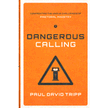Counselors Reflect on Dangerous Calling by Paul Tripp
A Series to Care for the Care Takers of God’s People
“Human beings are always assigning themselves some kind of identity. There are only two places to look. Either you will be getting your identity vertically, from who you are in Christ, or you will be shopping for it horizontally in the situations, experiences, and relationships of your daily life. This is true of everyone, but I am convinced that getting one’s identity horizontally is a particular temptation for those in ministry.” (Paul David Tripp, page 22)
When you think of the word dangerous, what comes to mind? Do you think about a person swimming in the depths of the ocean among sharks? A train full of people about to head over a bridge that will not withstand the weight and fall into the icy waters below? A curled rattlesnake about to strike an unknowing hiker? Webster defines dangerous as “exposing to or involving danger; able or likely to inflict injury or harm.” In the previous examples, sharks, falling into icy waters while trapped in a train, and snake venom can all “inflict injury or harm.” So what about the ministry? Is ministry dangerous?
Paul David Tripp addresses this question in his book Dangerous Calling. Culture often defines calling in terms of the profession that someone has. Examples include teacher, lawyer, doctor, pastor, counselor, etc. Rightly understood, however, calling must first be understood in the context of relationship. Os Guinness notes that “primary calling” must first be understood as being called to God, not a vocation. Our “primary calling” is a call “to Someone—not to something or somewhere.” “Secondary calling,” including vocation, is everything that should be “thought, spoken, lived, and acted entirely for God.” How often, though, do believers place their primary identity in “horizontal things?” Like Christmas shoppers shopping for the perfect item, we often shop around, looking for something to “fulfill us.” While in seminary, perhaps studying that was once an act of worship eventually “morphs” into something that is all consuming. (To be valued means to make straight A’s.) Perhaps a pastor who first took a leadership role in order to glorify God with his teaching and shepherding gifts has now found that his worth is based on the size of his congregation. Perhaps he wants to be known as the pastor of ___________ church. Perhaps the number of “converts” that his church has for the year has become his worth. For the biblical counselor who first wanted to honor God with his or her gifts, does he or she begin to base worth on the amount of cancellations for the week?
One of the biggest dangers of ministry is finding identity in anything other than Christ. Being a straight-A seminary student, pastor with high church membership or conversions, or a biblical counselor with many counselees are not bad things, in and of themselves. They become dangerous, though, when one’s identity becomes wrapped up in them. They are, to quote Tripp, “situations, experiences, or relationships”—horizontal things—taking the place of one’s primary identity that should be in Christ. Anything can be dangerous when focus is off of Christ—even ministry. Has your ministry become a way in which you define yourself? If so, please stick with us as a Bridgehaven staff as we blog about Dangerous Calling.
 |
Dangerous Calling: Confronting the Unique Challenges of Pastoral Ministry By Paul David Tripp / Crossway Books & Bibles |